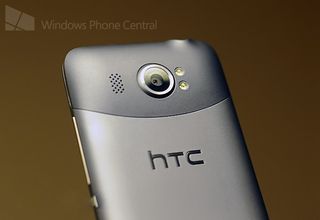HTC reportedly cancels large-screened Windows Phone amid resolution issues

One step forward and two steps back. Sometimes that old saying can be applied to Microsoft, who despite doing their best to stay ahead is often slightly behind.
Such is the case with Windows Phone 8 and the ability to now have 720P and 763x1280 resolutions. On screens that are 4.7” or smaller, it’s simply stunning and a nice treat to have but its apparent limits may now be its undoing as HTC has reportedly cancelled a new Windows Phone because of it.
The phone, possibly the rumored HTC Zenith, has allegedly been abandoned due to the fact that Windows Phone 8 cannot do 1080P resolution, which would scale nicely on post 4.8” devices. The boundary, something for which Android has no problem with, is said to have been the deciding factor for HTC as anything less than 1080P would not be as competitive.

HTC Droid DNA (L) and the HTC 8X (R)
The HTC Zenith, according to the original rumor, featured a 4.7" 720p Super LCD 2 screen, 8mp camera with 1080p video capture, 42Mbps HSPA+, and a quad-core Qualcomm processor. We’re not sure if Bloomberg is reporting on that phone or another planned device with an even larger screen as obviously the resolutions don't match. Any solid information about the Zenith has been non-existent since June though with CES coming up in January, HTC would have a good venue to announce it.

Of course the 1080P resolution limitation is arbitrary in Windows Phone 8 as Microsoft can scale up the OS almost indefinitely (in theory the OS can support 64 cores for the CPU). But Microsoft needs to actually enable 1080P resolutions for OEMs and it is not clear if and when that will take place. That means the only hope for HTC to make such a massive Windows Phone is to wait until Microsoft updates the OS, possibly with Apollo+ for Spring 2013.
While all of that sounds great it of course means once again in terms of hardware, Microsoft is playing catch up to Google and Android. We could question the market for ‘phablet’ phones (e.g. HTC Droid DNA) and whether it is worth it for companies like HTC or Nokia to chase, but it misses the point: Microsoft is behind and it’s affecting their OEM partners, who have their hands tied.
Get the Windows Central Newsletter
All the latest news, reviews, and guides for Windows and Xbox diehards.
Source: Bloomberg; Thanks for all who tipped us!

Daniel Rubino is the Editor-in-chief of Windows Central. He is also the head reviewer, podcast co-host, and analyst. He has been covering Microsoft since 2007, when this site was called WMExperts (and later Windows Phone Central). His interests include Windows, laptops, next-gen computing, and watches. He has been reviewing laptops since 2015 and is particularly fond of 2-in-1 convertibles, ARM processors, new form factors, and thin-and-light PCs. Before all this tech stuff, he worked on a Ph.D. in linguistics, watched people sleep (for medical purposes!), and ran the projectors at movie theaters because it was fun.
